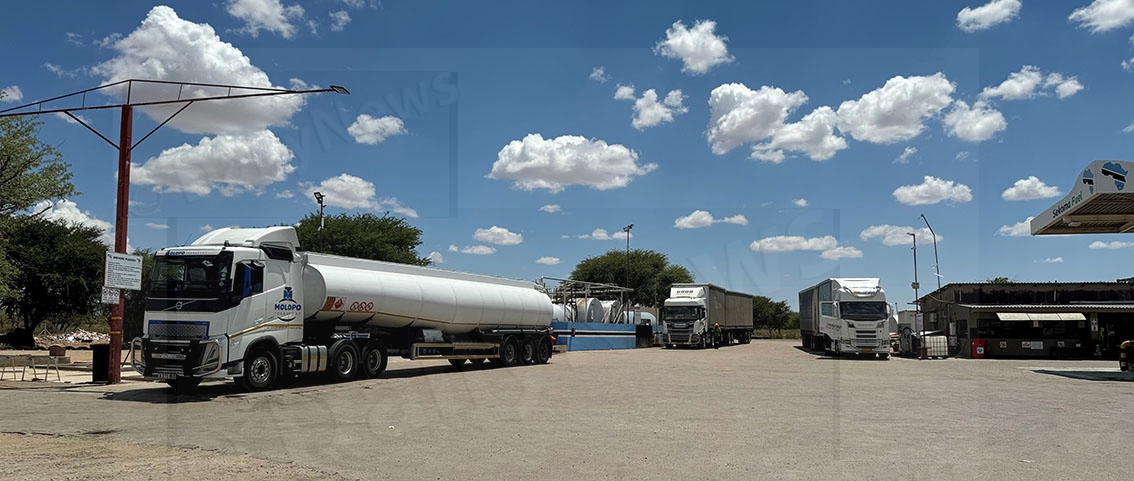Truck drivers raise security alarm along TKC
08 Dec 2024
Truck drivers ferrying goods along the Southern African Development Community (SADC) trans logistics route of the Trans Kalahari Corridor (TKC), have raised alarm on security where fuel is frequently stolen while on rest.
The TKC spans South Africa, Botswana and Namibia.
South African truck driver of Trans World Trucks, Mr Jacob Engelbrecht, who ferries goods from South Africa to Namibia through Botswana, expressed concern about the rising problem that truck drivers started experiencing about three months ago.
“Fuel and truck spotlights were stolen while I rested at Tsootsha Fortunately, the fuel left was enough to take me to the Mamuno border. I did not report to the police because it only happened once, but I hear some truck drivers have reported, and there was nothing much they could do as criminals disappeared into thin air,” he said.
He said the criminals’ hotspot was between Tsootsha and Lonetree, “The extent of damage depends on whether they get interrupted.”
He suggested more police patrols along the corridor because truck drivers are now fearful of resting at the said hotspots.
They are forced to drive longer distances until they reach the Mamuno border without resting to avoid danger.
Mr Engelbrecht noted that Botswana used to be the safest route along the corridor, where truck drivers could rest anywhere without fear, but the narrative is changing due to a recent spate of crimes.
A Namibian truck driver of 6000 Investments, Mr Moses Mathews, who has been driving trucks for about a decade, also expressed concern about the safety of trucks along the Trans Kalahari Corridor.
Although he has not experienced the theft he told BOPA that there was growing fear amongst truck drivers about the increasing looting of diesel at Tsootsha, which has forced truck drivers to be vigilant to avert looming danger when driving along the corridor.
“When this happens, we have to send somebody with diesel to the truck that has been affected, which is more costly to the client, and there is also repair that has to be done to the truck because these criminals break open the tank to take out the diesel. The cost implication is too much,” said Sekoma Fuel Station/truck stop manager Mr Stefan Eloff.
Mr Eloff recalled an incident three months back, when criminals broke the truck fuel tank to steal fuel while the driver was resting.
“This is already costing us clients as some have started to go down south, not using the Botswana route to travel to Johannesburg, South Africa. It is already affecting the corridor because the trucks have now started to use the longer route going to the South of Namibia through Upington, South Africa, bypassing Botswana,” he said.
He said if the problem escalated, the government could also lose revenue as truck drivers resort to using other corridors.
“We have noticed a little bit of traffic reduction because of this. We are affected in the long run,” he said. He has thus called for the prosecution of perpetrators.
In an interview, TKC chief executive director Mr Leslie Mpofu said they would take action and engage law enforcement officers and all relevant stakeholders. “We are not aware of such report, and we encourage truck drivers to report such issues to the police and us.
Now that the media has alerted us about this problem, we will engage relevant stakeholders. Our truckers need to be safe, if criminals steal fuel it can cause other problems such as environmental hazards, ignite fires, and people could lose lives.
There could be loss of revenue as truckers will now shy away from the TKC, insurance premiums could go up because of these insecurities, and these costs could be channelled to consumers, which is what we do not want,” Mr Mpofu said.
According to a baseline report by the Cross Border Road Transport Agency on the Trans Kalahari Corridor of March 2022, most of the corridors in the region were characterised by a wide range of constraints that vary by corridor included poor corridor services, comfort and safety, delays and long transit times, and high operational costs, amongst others.
The safety parameter was raised as one of the critical determinants of corridor performance.
Truck drivers’ lack of rest along the corridor led to fatigue-caused road accidents, caused by lack of rresting facilities on the TKC.
Drivers travel long distance, up to 500km or more, in search of a safe place to park, as the TKC does not have enough places for trucks to park overnight for rest.
TKC was established with a political and economic vision to contribute towards more profound regional integration programmes of SADC, SACU and NEPAD, promote trade facilitation, regional cooperation and integration; the road network spans approximately 1900 kilometres across the territories of Botswana, Namibia and South Africa. Ends
Source : BOPA
Author : Calviniah Kgautlhe
Location : Sekoma
Event : Interview
Date : 08 Dec 2024







